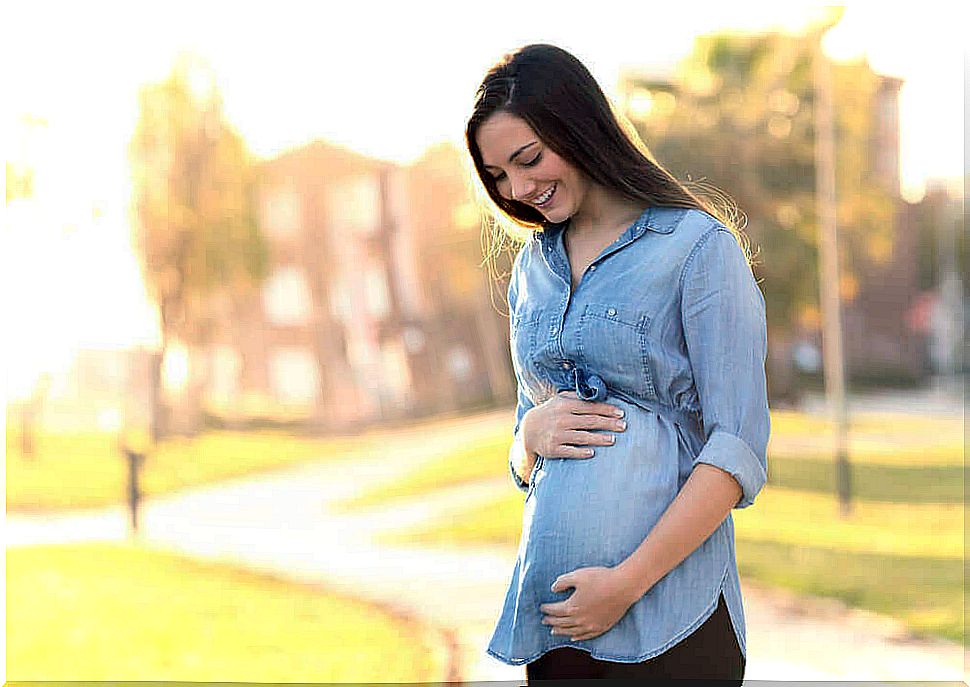The Changes That Happen In The Body During Pregnancy

As the baby grows, the belly grows and gives the unmistakable signal that you are creating a life. However, the changes that happen in the body during pregnancy go far beyond the growing belly. The intense activity of hormones and the baby’s growth make your body experience an intense transformation.
As the pregnancy progresses, your body exhibits anatomical, physiological and chemical changes. All these changes are what guarantee the proper development of the baby, from fertilization (when the fertilized egg is implanted in the uterus) until delivery.
Changes that happen in the body during pregnancy
The changes experienced by pregnant women are a matter of concern for many women, both for aesthetic reasons and because they indicate that something is wrong with the baby’s pregnancy. Knowing what your body will experience during pregnancy will help you feel calmer and more confident with the signals you receive from the process you are going through.
1. Most obvious changes

Breasts gain weight and size from the first few weeks. The veins and nipples become more noticeable, the areolas darken, and small lumps called Montgomery’s tubercles appear. The breasts show the ability that every woman has to breastfeed her baby.
Gaining weight is arguably the most dreaded change for women. During pregnancy, the obstetrician usually tells you to gain only one kilogram per month. If you are at your ideal weight in early pregnancy, it is normal for you to gain up to 12 pounds. If you are overweight, you should not gain more than 9 pounds.
The more the belly swells, the skin stretches, changes color and the terrible stretch marks can appear. Therefore, it is very important that you hydrate your entire body after showering from the first days of pregnancy until the end.
The fluid retention your body experiences in pregnancy causes swelling in your legs. The growth of the uterus also hinders the circulation of blood through the veins, and in addition to the swelling, unpleasant varicose veins can appear.
In addition, hair and body hair grow even more. Hyperpigmentation is frequent, that is, spots appear in different areas of the skin. One of the most characteristic points is the darkening of the linea nigra , which crosses the mother’s belly from the pubis to the navel, or even the breasts.
2. More uncomfortable changes
Nausea, vomiting and dizziness are the most uncomfortable sensations suffered by the body during pregnancy. If they are too intense, they make the pregnant woman’s daily life very uncomfortable. Although extremely unpleasant, these symptoms usually do not exceed the first trimester.
Some women suffer from excessive sweating with a stronger odor during pregnancy. The increase in the amount of blood increases the body temperature and the body’s response is to produce more sweat. Also, hormonal changes make the smell more intense.
It’s normal to feel more tired during the day, especially in the first and last trimesters of pregnancy. Pregnant women yawn many times throughout the day. This tiredness will be fueled by the difficulty of falling asleep at night.
Insomnia is common, both because of the new mom’s restlessness asking herself questions about the pregnancy and the baby, and also because it will become increasingly difficult to find a comfortable sleeping position.
3. Physiological changes

The growth of the uterus takes up the space of the other internal organs, so its functioning is affected. For example:
- The bladder is compressed, so you urinate more often.
- Pressure in the lungs makes breathing difficult.
- The stomach rises and you may suffer from heartburn or reflux.
- These physiological changes also increase insomnia.
4. Internal changes
The pregnant woman’s body generates a liter and a half more blood. Therefore, from 4 liters of blood, a woman has 5 to 6 liters. The heart has to beat faster to pump all that blood and feed the placenta. Cardiac expenditure increases from 30 to 50%.
The heart rate accelerates between 10 and 15 beats per minute, even during sleep. If you have twins, raise this value a little higher. Also, blood pressure tends to drop during the first two trimesters of pregnancy as the vessels dilate, but the values you used to have before getting pregnant are restored in the third trimester.
final reflection

A woman’s body reaches its peak of perfection the moment a new life is born. All these transformations, however uncomfortable they may be, have the same objective: to create a new human being.
We can guarantee that when you have your baby in your arms, you won’t remember the bad times anymore. For now, be patient and enjoy the sweetest of waits.








